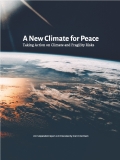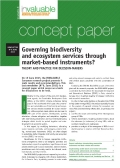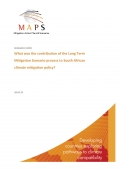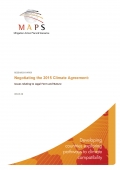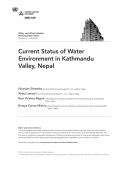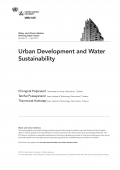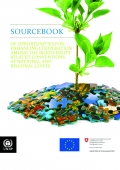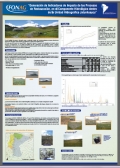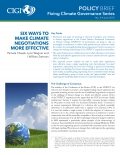Publication
Climate change is a global threat to security in the 21st century. We must act quickly to limit the future risks to the planet we share and to the peace we seek.
Achieving a robust agreement to reduce greenhouse gas emissions is of paramount importance. Yet the relentless...
Whether in the context of the post-2015 development agenda, the Sustainable Development Goals (SDGs), or the UNFCCC climate conference taking place in Paris at the end of this year, the conservation and sustainable use of biodiversity and ecosystem services remains essential for human...
In 2005 the South African Cabinet (referred to as Cabinet from now onwards) mandated the Department of Environmental Affairs and Tourism (DEAT) to commission the Long Term Mitigation Scenario (LTMS) process. Lasting two years, the LTMS was a combination of modelling and facilitated...
The on-going UN negotiations for a 2015 climate agreement have yet to resolve two fundamental legal issues on which the effectiveness of this agreement will hinge. First, they have yet to resolve the precise legal form this agreement will take. Parties agreed in Durban, 2011 to...
This research has reviewed existing water quality management frameworks and spatial relationships between land uses and urban water quality in Kathmandu Valley. Primary data on water quality has been collected through sampling of river water from various locations within the valley. Similarly, review of secondary data and related literature from various sources, field observation, interaction and...
Due to limited access to safe drinking water and lack of adequate sanitation facilities in most developing counties, the rapid population growth and urbanization have caused serious water scarcity and water pollution problems. Another prevalent environmental problem is global warming caused by burning of fossil fuels which has negative impacts on the hydrological cycle and consequently...
The Sourcebook provides an overview of the possibilities for enhancing the coherent implementation of the biodiversity-related conventions within five thematic areas (National Reporting and Information Management; Science-Policy Interface; Capacity Building; The Strategic Plan for Biodiversity 2011-2020, the Aichi Biodiversity Targets and NBSAPs and; Financial resource mobilisation and...
Con la finalidad de generar información para un adecuado manejo del ecosistema páramos y proponer alternativas e instrumentos de gestión de las cuencas que abastecen de agua para la ciudad de Quito. El Fondo para la Protección del Agua (FONAG) desarrolla el proyecto "Generación de Indicadores de Impacto de los Procesos de Restauración, en la Unidad Hidrográfica del Río Jatunhuaycu" que...
Proponemos una metodología para explorar el potencial de la regionalización de indicadores hidrológicos para evaluar impactos CCUTD proveyendo un método estadísticamente robusto en un ambiente de escasez de datos que puede ser aplicado en cualquier región del mundo. La metodología es implementada en 20 cuencas en los Andes Tropicales. Relaciones entre 42 características físicas y 46 indicadores...
Key Points
- Frustration and anger are growing at the lack of progress and consensus in climate negotiations at the United Nations Framework Convention on Climate Change (UNFCCC). If governments are going to take on meaningful commitments to reduce their...

